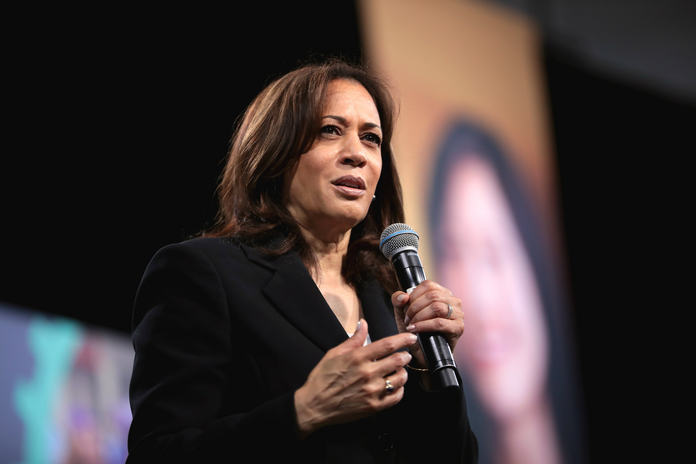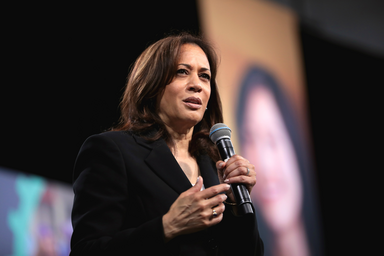Kamala Harris‘ interview on Call Her Daddy earlier this month sparked a wave of contrasting headlines to the vice president giving an interview on a „raunchy sex-podcast“. With less than a month to go until the November election, this was one of the rounds Harris was making on late night shows and podcasts to increase her profile. But her interview with Call Her Daddy, hosted by Alexandra Cooper, stands out. As the world‘s second most streamed podcast, Call Her Daddy reaches five million listeners each week – mostly young women – covering topics like mental health, sexuality, dating and relationships. With 24% of her audience identifying as Republicans and 20% as independents, this Harris campaign’s decision makes sense: the podcast reaches a traditionally non-democrat and unpolitical audience.
Women’s Issues as Core Political Issues
Ahead of the interview, Cooper shared her own thought process, acknowledging that the choice of questions and issues for the interviews was a difficult one. She self-ironically remarked that she is „probably not the one to be having the fracking conversation“ and chose to focus on women’s issues. Over the course of the interview Harris addressed issues like abortion rights, sexual abuse and economic policies impact women’s financial independence. The Vice President underlined the practical importance of these topics, a message particularly directed at listeners who may not typically engage in politics.
Closing the Gender Gap in Political Engagement
While it may be no surprise that women are shamefully underrepresented in politics, studies also show that women are generally less interested in politics than men. This gap in interest is already present at a young age and widens with education and age. A female population less interested in politics is less likely to vote or to get politically engaged, which raises the question – who is then going to speak up and vote in their interests?
This is why Harris’ interview with a long-time unpolitical, female-focused podcast feels so significant. Can the centering of women’s issues motivate political interest in women and bring more women into politics? And is an active centering of women’s issues not long overdue anyway, given the fact that they affect half of the population?
In the interview Harris talks about the case of Amber Thurman, a Georgia woman that died after being denied necessary health care due to the state’s strict abortion laws. She is moving away from a seemingly theoretical, ideological debate and is putting women’s healthcare into practical terms and highlighting the very real consequences of policy decisions. Particularly Harris‘ point on economic independence as a factor in women‘s safety from domestic violence takes this even further, showing that women’s issues, often treated as a political afterthought, are, in fact, central issues.
In a world where leadership summits are still a sea of suits and female politicians face harsher scrutiny than their male counterparts, there is a often an impression that there is no room for women in politics or discussions thereof, be it in elected office or at the dinner table conversation. Centering women’s issues is not only essential on its own, it encourages women to get engaged in politics and to feel like there is room for them and the issues that personally impact their lives.
From Identity Politics to Practical Policy
Harris‘ approach to centering women’s issues shows an interesting shift, particularly in comparison to Clinton’s 2016 campaign – while the latter heavily emphasized the possibility of her being the first female president, the former is noticeably holding back on that front, rather focusing on policies affecting women. This might be the fear of being (negatively) perceived as an „ambitious woman“ – which would warrant its own discussion– but it also shows a shift from identity politics to specific policy questions when it comes to women’s issues. Underlining the practical consequences of policies for women might feel more authentic to voters than a certain brand of „girlboss feminism“ of the 2010s, that was closely tied to identity politics – where the often false assumption was made that women would vote for a candidate solely because she was female.
Harris’ choice to appear on a with a sex, dating and advice podcast signals an interesting shift in the political discourse. Female voters are starting to be taken seriously and their interests are being adressed openly and without shame. It shows the possibility for a political landscape that gives issues like women’s healthcare, financial independence and sexual abuse the time and attention they deserve.


